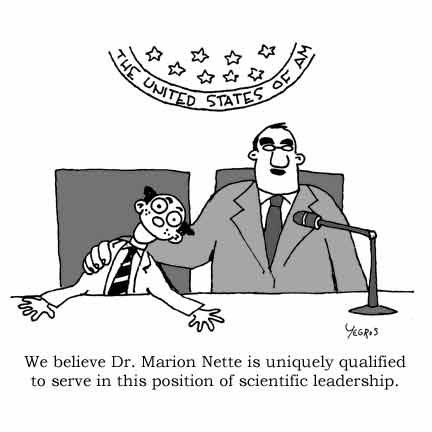Perchlorate is both a naturally occurring and man-made chemical. It is a critical ingredient in explosives such as rocket fuel and fireworks. Perchlorate may have adverse health effects because it can disrupt the thyroid’s ability to produce hormones needed for normal growth and development. The Scientific Advisory Board of the Environmental Protection Agency is looking at scientific research to determine what – if any – level of perchlorate is safe. Who do you think should be examining that evidence and helping EPA make this decision? I think I would want scientists with both expertise and independence.
 Last fall, however, Reps. Ralph Hall (R-TX), Dana Rohrabacher (R-CA), Andy Harris (R-MD), and Dan Benishek (R-MI) introduced legislation that would compromise the scientific integrity of the Scientific Advisory Board.
Last fall, however, Reps. Ralph Hall (R-TX), Dana Rohrabacher (R-CA), Andy Harris (R-MD), and Dan Benishek (R-MI) introduced legislation that would compromise the scientific integrity of the Scientific Advisory Board.
Today I am testifying in a congressional hearing to examine a new version of that legislation. This draft bill contains provisions that would slow the work of the Scientific Advisory Board, remove longstanding and widely accepted practices for dealing with conflicts of interest and reduce the expertise of Scientific Advisory Board members. It will probably not surprise you that I am not a big fan of this proposed legislation.
Slowing the committee down
The Scientific Advisory Board is already overburdened and does not need its scope broadened – especially in this time of budget cuts and trying to do more with less funding. Asking the SAB to respond in writing to every submitted comment might seem like a good idea except that they already read and consider them and any special interest could bring the committee’s work to a virtual standstill by submitting thousands or even tens of thousands of comments every week. Adding red tape is a tool long used by special interests to delay regulations that protect your health and safety.
Conflict of interest
I will tell Congress that taking money from a private interest does affect decision-making. That’s why we have ethics in government laws and that’s why scientific journals ask scientists to disclose their funding sources.
Removing key experts
I will tell Congress that the National Academies of Science, the National Institutes of Health, and the National Science Foundation all successfully prevent scientists from reviewing their own work without removing them from their committees.
I recently worked with UCS President Kevin Knobloch when he participated in a study by the Bipartisan Policy Center on this topic and was a member of the Research Integrity Roundtable of the Keystone Center when they reported on dealing with conflict of interest and bias in scientific advisory panels and I will tell Congress how we can do better so you can grab a glass of water, take a gulp of air or walk down the street and trust that the best and most independent scientists are helping the EPA protect you!
If you want to follow along you can watch here.
